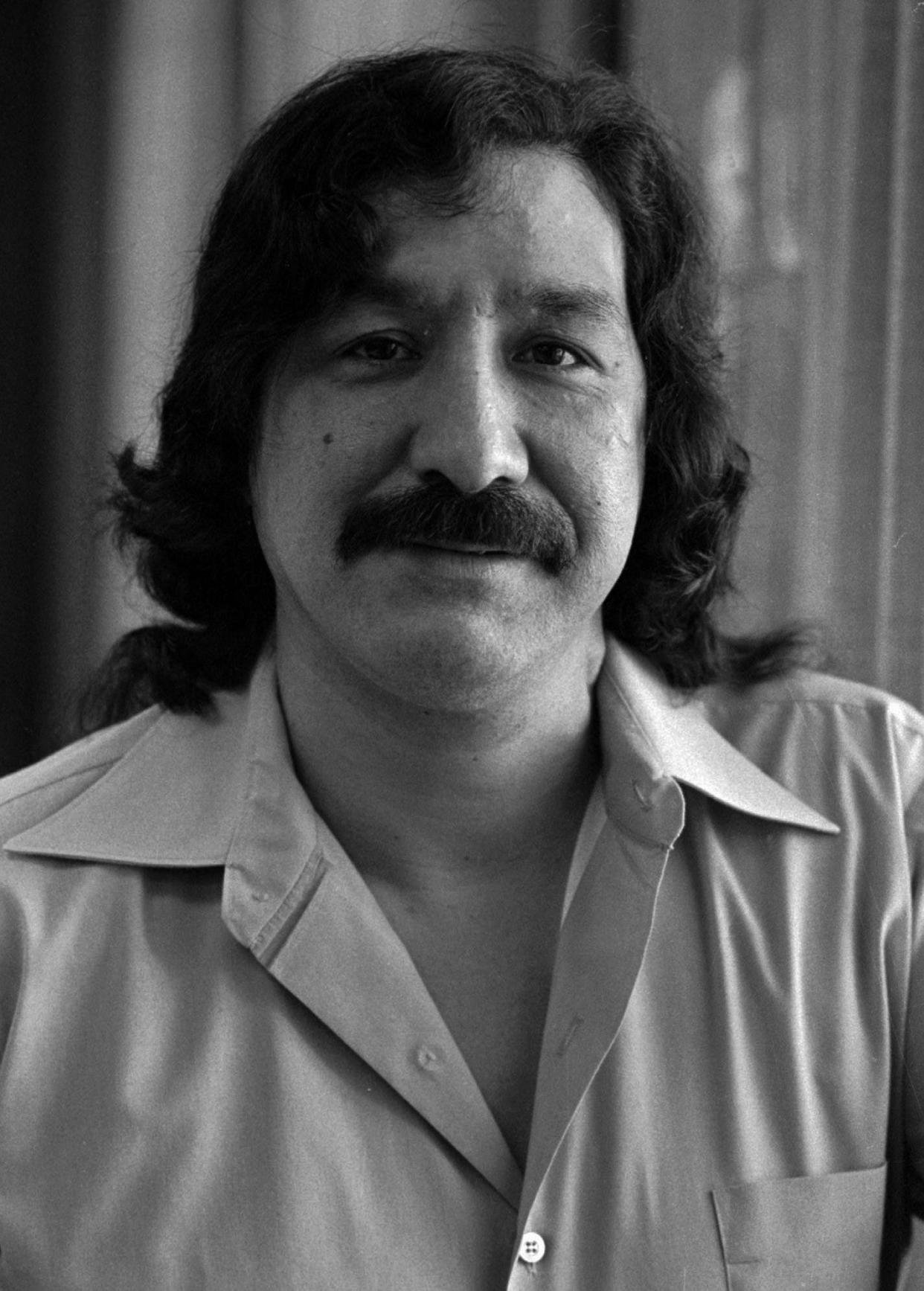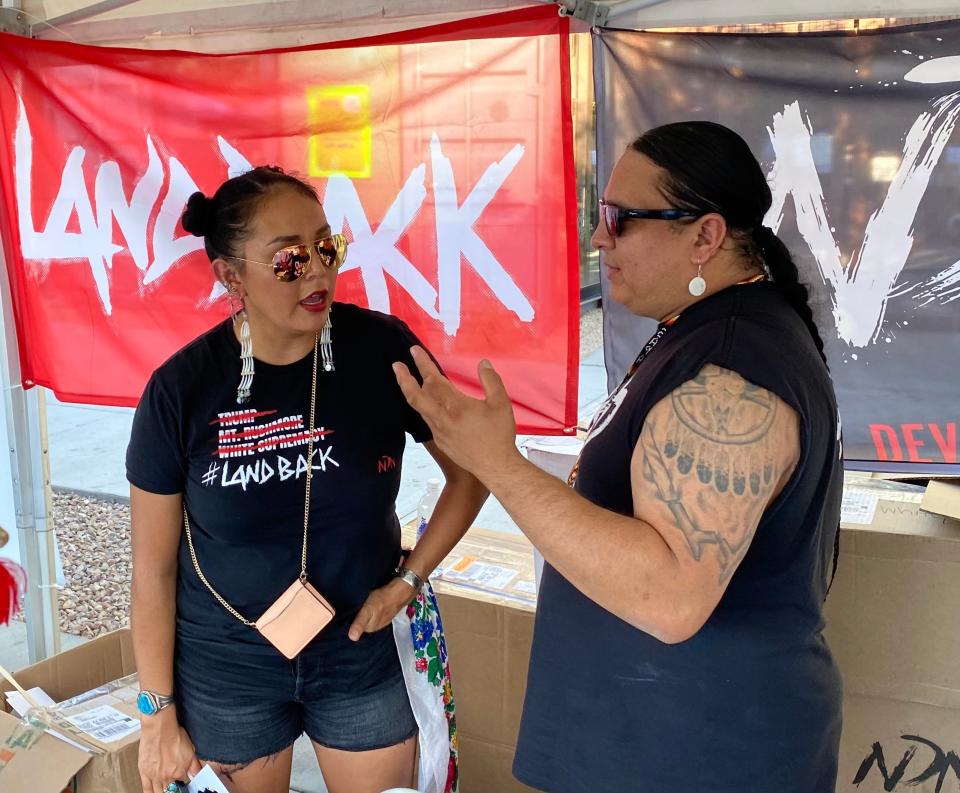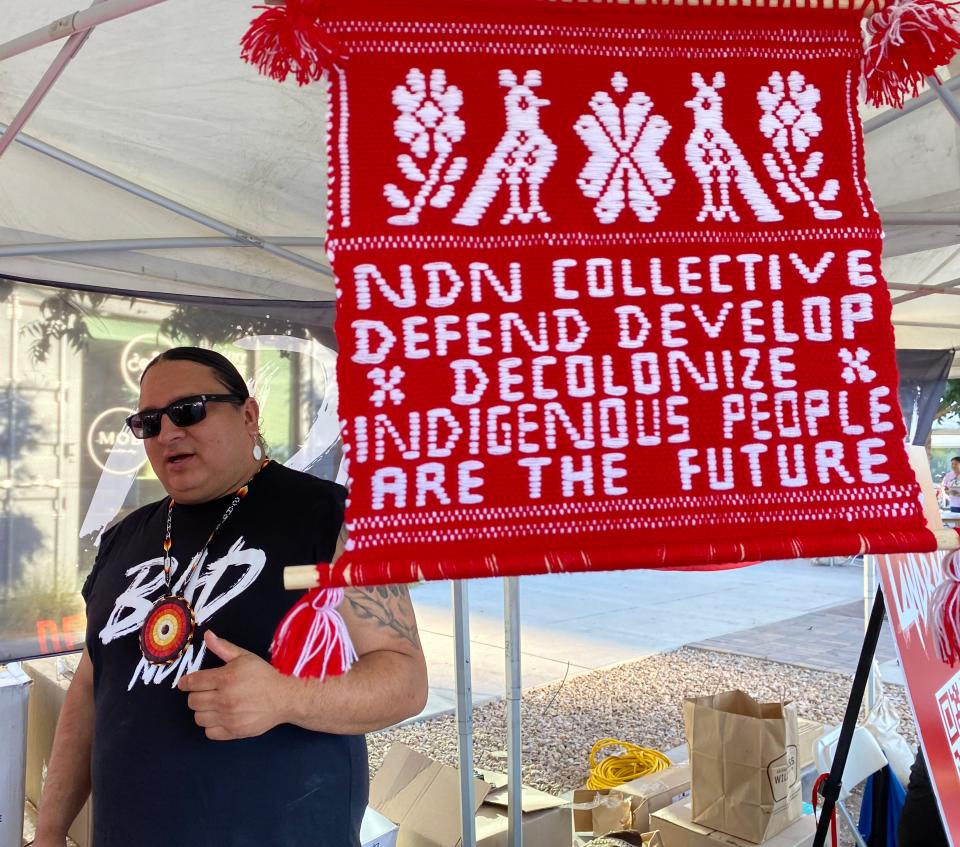Activists say Leonard Peltier is wrongly imprisoned for his role in a deadly protest

Janene Yazzie raised her hand during the United Nations Permanent Forum on Indigenous Issues in April 2019, said thank you in Navajo and began to read a statement written by Lenny Foster, a Navajo elder who had been visiting imprisoned activist Leonard Peltier since 1985.
Peltier, an Anishinaabe and Dakota elder who is an enrolled citizen of the Turtle Mountain Band of Chippewa Indians, has been incarcerated for 45 years, convicted for aiding and abetting in the murder of two FBI agents in June 1975. He is currently being held at the Coleman Federal Correctional Complex in Coleman, Florida.
The two agents were shot dead during a confrontation involving members of the American Indian Movement on the Pine Ridge Indian reservation in South Dakota. Peltier was convicted in 1977 and sentenced to two consecutive life sentences. He has always denied killing the agents.
Now, nearly 50 years after Peltier was arrested, Indigenous activists are renewing their call for his release. His attorney Kevin Sharp, a former U.S. District judge in Tennessee who is representing Peltier pro bono, has said in multiple interviews with various media outlets that Peltier's constitutional rights have been violated repeatedly, and that the evidence in the case doesn't add up. In prison, Peltier's health is declining.
At the time of Yazzie’s address, she was working with the International Indian Treaty Council. She said competing issues had prevented Peltier's case from getting a serious discussion, so she met with Foster to articulate the message.
“Leonard Peltier has been unjustly held in prison long past an acceptable sentencing for the crime he was convicted of, which was aiding and abetting the murder of the two FBI agents, not directly murdering, but aiding and abetting,” Yazzie told The Arizona Republic during a recent Indigenous People’s Day celebration in downtown Phoenix. “The circumstances around the case were textbook for the type of injustices Indigenous people face, especially when they're rebelling against what government actions are taking place in putting our people in danger."

Clemency attempts have repeatedly failed
The call for President Joe Biden to grant 78-year-old Peltier clemency has been renewed in recent years. Near the end of former President Bill Clinton’s second term, the possibility Peltier would be granted clemency was the closest it has ever been. Peltier was denied clemency by President George W. Bush and President Barack Obama. But of the 176 Americans whose sentences were commuted by Clinton, Peltier was not one of them in part, activists say, because about 200 FBI agents marched to the White House to oppose clemency.
“There was an open demonstration by the FBI to convince Clinton not to do this” said Yazzie. “But you take into context what was going on politically with the Clintons, like the FBI threatening to be against you, that's a significant threat, the FBI organizing to protest outside the White House to make sure Leonard Peltier doesn’t come out.”
In the statement Yazzie read, she asked that the Chair of the Expert Mechanism on the Rights of Indigenous People seek a dialogue with the United States, appropriate human rights organizations and Indigenous peoples to bring about relief and justice for Peltier.
“This case demonstrates how in the U.S., the courts and criminal justice system criminalize dissent for purposes of political repression,” she read. “The U.S. government has failed to address the staggering number of constitutional violations in the trial of Leonard Peltier, including the U.S. government mishandling of key ballistics evidence, and threatening of witnesses against Leonard who were coerced into signing statements used to convict him.”
In September, over three years after Yazzie read her statement, a Walk to Freedom for Leonard Peltier began in Minneapolis and concluded earlier this month in Washington D.C. Yazzie says the truth of Peltier's case and nearly five decades of imprisonment has always been known among Native activists like her and Nick Tilsen, president and CEO of NDN Collective.
“We have to remember, Leonard Peltier in the 1970s was put in prison after he was illegally extradited from Canada based on lies and planted myths by the FBI,” said Tilsen, who is a citizen of the Oglala Lakota Nation. “At a time when the federal government and the FBI was engaged in COINTELPRO war to discredit the American Indian Movement.” COINTELPRO was a covert FBI operations aimed at political activities.

Activists say Peltier's case was meant to discredit movement
Through the decades notable human rights groups like Amnesty International and human rights activists like Nelson Mandela have all called for Peltier’s release. Recently, a 17-page document from an arbitrary detention working group for the U.N. Human Rights Council said the U.S. government should free Peltier. It also said the country should conduct an independent investigation into whether his rights were violated.
“Leonard Peltier has been wrongfully accused and wrongly convicted,” said Tilsen. “The longest Indigenous political prisoner currently in the United States is still incarcerated. It's become an intergenerational struggle, because its an example of how the justice system has treated Indigenous people.”
Tilsen said the FBI was used as a tool to destroy the Indigenous peoples’ rights movement, as well as noting that the tactics used against Peltier were meant to discredit the American Indian Movement.
“I’m from the Pine Ridge Reservation and when the shooting happened, that was a time in which there was over 100 unsolved murders,” said Tilsen. “Many of them were women. Most of all those murders went uninvestigated. As they try to stick this murder wrap on Leonard Peltier, they also invisiblize the struggle of that time and all of the other murders that went uninvestigated, which shows you what their intention is. That’s why when there is a push for Leonard Peltier’s clemency, then there’s this big push from the FBI, who use their lobbying, who use taxpayers money, to keep him in jail.”
Peltier contracted COVID-19 months ago, which led activists to call for his release. His ailments also include kidney disease, Type 2 diabetes, high blood pressure, a heart condition, a degenerative joint disease and constant shortness of breath and dizziness. It was reported in 1986 that a stroke left him virtually blind in one eye. In January 2016, doctors diagnosed him with a life-threatening condition, a large and potentially fatal abdominal aortic aneurysm that could rupture at any time and would result in his death.
In March, the Democratic National Committee’s Native American Caucus put out a statement saying Peltier’s continued incarceration symbolizes the ongoing racial injustices towards Native Americans.
The statement said Peltier continues to be incarcerated even after James Reynolds, the United States Attorney whose office handled the prosecution and appeal of Peltier’s case, admitted the prosecution was unjust and that prosecutors were unable to prove that Peltier had committed any offense on the Pine Ridge Reservation.
“We believe it is important to continue to make the request and seek for Mr. Peltier's release,” said Clara Pratt, chair of the DNC Native American Caucus.
She said the latest moves have been led by Ruth Anna Buffalo, who is in the caucus leadership. More recently, the DNC at large called for his release, which is significant, Pratt said.
“In 19 states, Native Americans are more likely to be imprisoned than any other race and ethnicity,” the caucus said. “This reality diminishes the Native Americans’ faith in the criminal justice system throughout the country and burdens our community with the intergenerational impacts of incarceration resulting from a law enforcement system that fosters racial injustices.”
U.N. statement causes a stir
In Yazzie's 2019 statement, she said the U.S. Parole Commission and the FBI have attacked Peltier's honor and reputation, alleging offenses for which he either was never charged or charges of which he was acquitted, and presenting uncorroborated testimony from criminal proceedings that Peltier was not a party to.
After Yazzie read her statement, she said the U.S. representative at the time became defensive and said her statement was "unfair, uncalled for, and unsubstantiated."
Yazzie said the strategy when discussing Peltier focuses on communication, framing and language to get the message across clearly and truthfully, because the challenge is how many have been conditioned for years to view this issue a certain way.
"It caused a big stir," said Yazzie of her statement at the U.N. "Because according to U.N. decorum, that was getting emotional on the grounds, so it did elicit reaction. Every branch of government will always elicit this very strong response on why he can't go free. They say it's because he murdered two FBI agents, which has long been disproven."
Arlyssa Becenti covers Indigenous affairs for The Arizona Republic and azcentral. Send ideas and tips to arlyssa.becenti@arizonarepublic.com.
Support local journalism. Subscribe to azcentral.com today.
This article originally appeared on Arizona Republic: Indigenous activist Leonard Peltier is wrongly imprisoned, groups say

